
Bon Jovi is an American rock band formed in 1983 in Sayreville, New Jersey. The band currently consists of singer Jon Bon Jovi, keyboardist David Bryan, drummer Tico Torres, guitarist Phil X, and bassist Hugh McDonald. Original bassist Alec John Such left the band in 1994, and longtime guitarist and co-songwriter Richie Sambora left in 2013. The band has been credited with "bridging the gap between heavy metal, rock and pop with style and ease".

Slippery When Wet is the third studio album by American rock band Bon Jovi. It was released on August 18, 1986, by Mercury Records in North America and Vertigo Records internationally. It was produced by Bruce Fairbairn, with recording sessions between January and July 1986 at Little Mountain Sound Studios in Vancouver. The album features many of Bon Jovi's best-known songs, including "You Give Love a Bad Name", "Livin' on a Prayer", and "Wanted Dead or Alive".
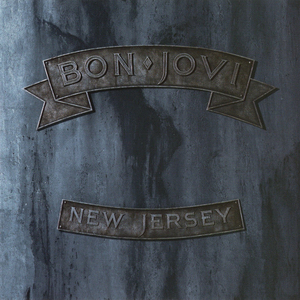
New Jersey is the fourth studio album by American rock band Bon Jovi, released on September 19, 1988, by Mercury Records. The album was produced by Bruce Fairbairn and recorded at Little Mountain Sound Studios in Vancouver, British Columbia, Canada. The album was the follow-up to the band's third album, Slippery When Wet, and reached number one on the Billboard 200 chart in its second week of release after debuting at number eight. It remained at the top for four consecutive weeks and was Bon Jovi's last album to do so until Lost Highway (2007). The album was named after the birth state of Jon Bon Jovi, New Jersey.

Keep the Faith is the fifth studio album by American rock band Bon Jovi, released on November 3, 1992, by Mercury Records. It is Bon Jovi's last studio album to feature all five original band members as bass guitarist Alec John Such was dismissed from the band in 1994, though it was not his last release with the band. It is Bon Jovi's first album since 1985's 7800° Fahrenheit not to be produced by Bruce Fairbairn. The album was produced by Bob Rock and was recorded at the Little Mountain Sound Studios in Vancouver, British Columbia. Keep the Faith marked a change to a "more serious interpretation of the band's pop-metal groove". It is also Bon Jovi's longest album to date, clocking in at 66 minutes.

These Days (stylized as (these Days)) is the sixth studio album by American rock band Bon Jovi, released on June 27, 1995, by Mercury Records. This was the first album Bon Jovi released after the dismissal of original bass guitarist Alec John Such, and their first album to be recorded officially as four-piece band (without an official bassist, but featured Hugh McDonald as a session/touring member on bass guitar). The album, produced by Peter Collins, Jon Bon Jovi and Richie Sambora, is praised by many critics and fans as their best album. These Days is overall a darker album in contrast to the band's usual brand of feel-good, inspiring rock songs and love ballads.
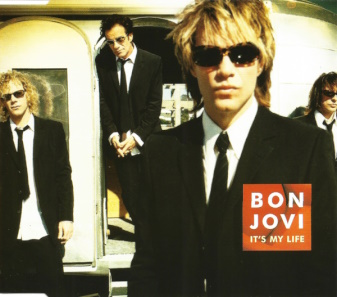
"It's My Life" is a song by American rock band Bon Jovi. It was released on May 8, 2000, as the lead single from their seventh studio album, Crush (2000). It was written by Jon Bon Jovi, Richie Sambora, and Max Martin, and co-produced by Luke Ebbin. The song peaked at number one in Austria, Flanders, Italy, the Netherlands, Portugal, Romania, Spain, and Switzerland while charting within the top 10 across several other countries and peaking at number 33 on the US Billboard Hot 100. "It's My Life" is Bon Jovi's most well-known post-1980s hit single and helped introduce the band to a new, younger fanbase.

"Livin' on a Prayer" is a song by the American rock band Bon Jovi, and is the band's second chart-topping single from their third album Slippery When Wet. Written by Jon Bon Jovi, Richie Sambora and Desmond Child, the single, released in late 1986, was well received at both rock and pop radio and its music video was given heavy rotation at MTV, giving the band their first No. 1 on the Billboard Mainstream Rock chart and their second consecutive No. 1 Billboard Hot 100 hit.
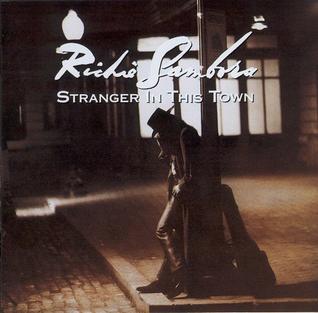
Stranger in This Town is the first solo studio album by Richie Sambora, the guitarist from the New Jersey band Bon Jovi. The album was released in 1991, while Bon Jovi was on a 17-month hiatus. Jon Bon Jovi also released a solo album, Blaze of Glory (1990), during this period.
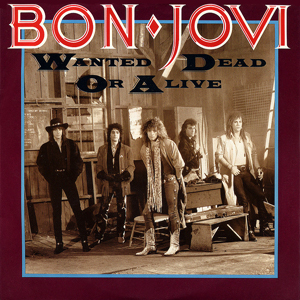
"Wanted Dead or Alive" is a power ballad by American rock band Bon Jovi. It is from their 1986 album Slippery When Wet. The song was written by Jon Bon Jovi and Richie Sambora and was released in 1987, as the album's third single. During a February 20, 2008 encore performance in Detroit, Jon Bon Jovi told the crowd about running into Bob Seger at a Pistons game. As he introduced his song "Wanted Dead or Alive", he said it was inspired by Seger's "Turn the Page" hit and called the song the band's anthem. The song peaked at number 7 on the Billboard Hot 100 chart and number 13 on the Mainstream Rock Tracks chart, making it the third single from the album to reach the Top 10 of the Hot 100. As a result, Slippery When Wet was the first glam metal album to have 3 top 10 hits on the Billboard Hot 100.
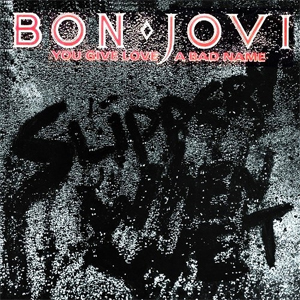
"You Give Love a Bad Name" is a song by American rock band Bon Jovi, released as the first single from their 1986 album Slippery When Wet. Written by Jon Bon Jovi, Richie Sambora, and Desmond Child about a woman who has jilted her lover, the song reached No. 1 on the U.S. Billboard Hot 100 on November 29, 1986, and became the band's first number-one hit. In 2007, the song re-entered the charts at No. 29 after Blake Lewis performed it on American Idol. Despite the lyrics of the chorus, the song should not be confused with "Shot Through the Heart", an unrelated song from Bon Jovi's 1984 self-titled debut album.

"Bed of Roses" is a song by American rock band Bon Jovi, first appearing on their fifth studio album, Keep the Faith (1992), then released as a single on January 11, 1993 by Mercury and Jambco. Jon Bon Jovi wrote the song in a hotel room while suffering from a hangover and the lyrics reflect his feelings at the time. The song contains drawn out guitar riffs and soft piano playing, along with emotive and high vocals by Jon Bon Jovi.

"Keep the Faith" is a song by American rock band Bon Jovi. It was written by Jon Bon Jovi, Richie Sambora, and Desmond Child. It was released on October 7, 1992, as the lead single from Bon Jovi's fifth album, Keep the Faith (1992). It is characterized by its driving bass line and is a live staple for the band. "I Wish Everyday Could Be Like Christmas" appeared as a B-side to the song in the United States. In the US, the song reached number one on the Billboard Album Rock Tracks chart and peaked at number 29 on the Billboard Hot 100. Worldwide, "Keep the Faith" topped the charts of Norway and Portugal and reached number five in the United Kingdom.
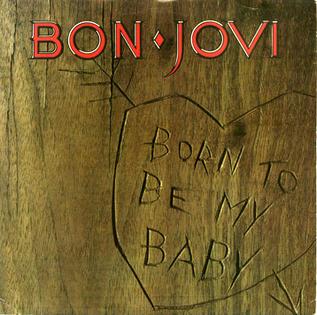
"Born to Be My Baby" is a song by American rock band Bon Jovi. It was written by Jon Bon Jovi, Richie Sambora, and Desmond Child. It was released on November 24, 1988 as the second single from their fourth studio album New Jersey. It peaked the following year at number 2 on the Cash BoxTop 100, 3 on the Billboard Hot 100, number 7 on the Mainstream Rock Tracks chart, number 22 in the UK, and number 30 in Australia.

"Bad Medicine" is a song by American rock band Bon Jovi. It was written by Jon Bon Jovi, Richie Sambora, and Desmond Child, and was released on September 12, 1988, as the lead single from the band's fourth album, New Jersey (1988). The song reached number one on the US Billboard Hot 100, Bon Jovi's third single to do so, and became a top-10 hit in Australia, Canada, Finland, Ireland, the Netherlands, and New Zealand.

"Lay Your Hands on Me" is a song by American rock band Bon Jovi. It was released on August 1, 1989, as the fourth single from the band's 1988 album New Jersey. It peaked at #7 on the Billboard Hot 100, becoming the band's fourth single from New Jersey to chart in the Top 10 and it also charted at #20 on the Mainstream rock charts.

"Living in Sin" is a power ballad by American rock band Bon Jovi. It was written by lead singer Jon Bon Jovi, and was released on October 7, 1989, as the fifth single from their fourth album New Jersey. It also was the fifth single from New Jersey to chart in the Top 10, allowing Bon Jovi to hold the record for the most songs from a glam metal album to reach the Top 10 of the Billboard Hot 100 and the Cash Box Top 100, peaking at #9 on both charts. It also reached #37 on the Mainstream rock charts.

"In These Arms" is a song by American rock band Bon Jovi, released on May 3, 1993 by Mercury and Jambco, as the third single from the band's fifth studio album, Keep the Faith (1992). The song was written by band members Jon Bon Jovi, Richie Sambora and David Bryan, and produced by Bob Rock.

"Never Say Goodbye" is a song by American rock band Bon Jovi, written by Jon Bon Jovi and Richie Sambora. It was a track off the band's third album, Slippery When Wet, on June 15, 1987, and reached number 11 on the mainstream rock charts and number 21 on the UK Singles Chart. Because it was not released domestically as a commercially available single, "Never Say Goodbye" was ineligible to chart on the Billboard Hot 100; Nevertheless, it reached number 28 on the Hot 100 Airplay survey.

"Everyday" is a song by American rock band Bon Jovi. It was released on August 19, 2002, as the lead single from the band's eighth studio album, Bounce (2002). The song was written and produced by Jon Bon Jovi, Richie Sambora and Andreas Carlsson. "Everyday" was nominated at the 2003 Grammy Awards for Best Pop Performance by a Duo or Group with Vocal.

"(You Want to) Make a Memory" is a song by American rock band Bon Jovi, which was released as the first single from their tenth studio album Lost Highway (2007). Written by Jon Bon Jovi, Richie Sambora and Desmond Child, it was released for radio airplay on March 20, 2007, and for download on the US iTunes Store on April 17, 2007. The song is a ballad, and was performed at several nationally-televised events in an effort to promote the single. "(You Want to) Make a Memory" peaked at number 27 in the United States, making it Bon Jovi's last single to break the Top 40 on the Hot 100.



















